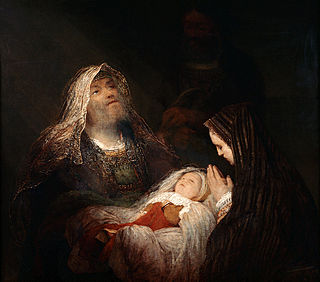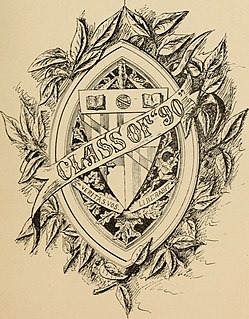 W
WThe Angelus is a Catholic devotion commemorating the Incarnation. As with many Catholic prayers, the name Angelus is derived from its incipit—the first few words of the text: Angelus Domini nuntiavit Mariæ. The devotion is practised by reciting as versicle and response three Biblical verses narrating the mystery, alternating with the prayer "Hail Mary". The Angelus exemplifies a species of prayers called the "prayer of the devotee".
 W
WThe Annunciation, also referred to as the Annunciation to the Blessed Virgin Mary, the Annunciation of Our Lady, or the Annunciation of the Lord, is the Christian celebration of the announcement by the Archangel Gabriel to the Blessed Virgin Mary that she would conceive and become the mother of Jesus, the Jewish messiah and Son of God, marking His Incarnation. Gabriel told Mary to name her son Jesus, meaning "YHWH is salvation".
 W
WThe Beatitudes are eight blessings recounted by Jesus in the Sermon on the Mount in the Gospel of Matthew. Each is a proverb-like proclamation, without narrative. Four of the blessings also appear in the Sermon on the Plain in the Gospel of Luke, followed by four woes which mirror the blessings.
 W
WBeatus vir are the first words in the Latin Vulgate Bible of both Psalm 1 and Psalm 112. In each case, the words are used to refer to frequent and significant uses of these psalms in art, although the two psalms are prominent in different fields, art in the case of Psalm 1 and music in the case of Psalm 112. In psalter manuscripts, the initial letter B of Beatus is often rendered prominently as a Beatus initial.
 W
WThe Benedictus, given in Gospel of Luke 1:68–79, is one of the three canticles in the first two chapters of this Gospel, the other two being the "Magnificat" and the "Nunc dimittis". The Benedictus was the song of thanksgiving uttered by Zechariah on the occasion of the circumcision of his son, John the Baptist.
 W
WIn Christianity, the Confession of Peter refers to an episode in the New Testament in which the Apostle Peter proclaims Jesus to be the Christ. The proclamation is described in the three Synoptic Gospels: Matthew 16:13-20, Mark 8:27–30 and Luke 9:18–20. Specifically, Peter declares, "You are the Christ, the Son of the living God."
 W
WCupio dissolvi is a Latin locution used in the Vulgate translation of the Paul's epistle to Philippians 1:23-4. The phrase, literally meaning "I wish to be dissolved", expresses the Christian desire to leave the earthly life and join Christ in eternal life. It has played an important role in discussions on the topic of suicide from the Middle Ages to the early Modern period. Over time, however, especially where national idioms derive from Romance languages, the phrase has acquired more secular and profane meanings and uses, expressing such concepts as the rejection of existence and the masochistic desire for self-destruction.
 W
WEcce homo are the Latin words used by Pontius Pilate in the Vulgate translation of the Gospel of John, when he presents a scourged Jesus Christ, bound and crowned with thorns, to a hostile crowd shortly before his Crucifixion. The original New Testament Greek: "ἰδοὺ ὁ ἄνθρωπος", romanized: "idoú ho ánthropos", is rendered by most English Bible translations, e.g. Douay-Rheims Bible and King James Version, as "behold the man". The scene has been widely depicted in Christian art.
 W
WIn biblical cosmology, the firmament is the vast solid dome created by God on the second day to divide the primal sea into upper and lower portions so that the dry land could appear: Then God said, “Let there be a firmament in the midst of the waters, and let it divide the waters from the waters.” Thus God made the firmament, and divided the waters which were under the firmament from the waters which were above the firmament; and it was so. And God called the firmament Heaven. So the evening and the morning were the second day.
 W
W"Gloria in excelsis Deo" is a Christian hymn known also as the Greater Doxology and the Angelic Hymn/Hymn of the Angels. The name is often abbreviated to Gloria in Excelsis or simply Gloria.
 W
WLucifer is the name of various mythological and religious figures associated with the planet Venus. Due to the unique movements and discontinuous appearances of Venus in the sky, mythology surrounding these figures often involved a fall from the heavens to earth or the underworld. Interpretations of a similar term in the Hebrew Bible, translated in the King James Version as the proper name "Lucifer", led to a Christian tradition of applying the name Lucifer, and its associated stories of a fall from heaven, to Satan, but modern scholarship generally translates the term in the relevant Bible passage as "morning star" or "shining one" rather than as a proper name, "Lucifer".
 W
WThe Magnificat is a canticle, also known as the Song of Mary, the Canticle of Mary and, in the Byzantine tradition, the Ode of the Theotokos. It is traditionally incorporated into the liturgical services of the Catholic Church and of the Eastern Orthodox churches. Its name comes from the incipit of the Latin version of the text.
 W
WNoli me tangere is the Latin version of a phrase spoken, according to John 20:17, by Jesus to Mary Magdalene when she recognized him after his resurrection. The biblical scene gave birth to a long series of depictions in Christian art from Late Antiquity to the present. The original Koine Greek phrase, Μή μου ἅπτου, is better represented in translation as "cease holding on to me" or "stop clinging to me", i.e. an ongoing action, not one done in a single moment.
 W
WThe Nunc dimittis ; also known as the Song of Simeon or the Canticle of Simeon, is a canticle taken from the second chapter of the Gospel of Luke, verses 29 through 32. Its Latin name comes from its incipit, the opening words, of the Vulgate translation of the passage, meaning "Now you dismiss". Since the 4th century it has been used in services of evening worship such as Compline, Vespers, and Evensong.
 W
WIn Christianity, the Passion is the short final period in the life of Jesus.
 W
WThe Lord's Prayer, also called the Our Father, is a central Christian prayer which, according to the New Testament, Jesus taught as the way to pray:Pray then in this way ... When you pray, say ...
 W
WPost tenebras lux is a Latin phrase translated as Light After Darkness. It appears as Post tenebras spero lucem in the Vulgate version of Job 17:12.
 W
WQuō vādis? is a Latin phrase meaning "Where are you marching?". It is also commonly translated as "Where are you going?" or, poetically, "Whither goest thou?".
 W
WThe Sermon on the Mount is a collection of sayings and teachings of Jesus Christ, which emphasizes his moral teaching found in the Gospel of Matthew. It is the first of the Five Discourses of Matthew and takes place relatively early in the Ministry of Jesus after he has been baptized by John the Baptist, finished his fasting and meditation retreat in the desert, and begun to preach in Galilee. The name and location of the mountain is unstated; the Mount of Beatitudes is the traditional interpretation.
 W
W"The truth will set you free'" is a statement which derives from verse 8:32 of the Gospel of John, a statement which Jesus addresses to a group of Jews who believed in Him.